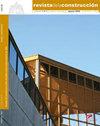Effect of different ashes from biomass olive pomace on the mechanical and fire properties of gypsum-based materials
IF 1.4
4区 工程技术
引用次数: 1
Abstract
In this study, biomass ashes from different energy valorization processes and storage conditions were used to make fire-resistant materials. Some of the ashes were subjected to a carbonation process. An 80/20 ash/gypsum ratio was used in all compositions. The density and different mechanical properties (compressive and flexural strength, superficial hardness, and dynamic modulus of elasticity), as well as fire resistance properties (insulating capacity and heat absorption capacity), were evaluated at 28 days. The energy valorization had a great influence on the particle size and the Loss On Ignition (LOI) of the fly ash. By increasing both, materials with lower mechanical properties (90%) were produced. Fire resistance was similar for the different ashes tested, but 50% lower than the gypsum material. When the ashes of the materials were carbonated, the material increases compressive strength by 400% compared to ashes without the carbonation process, and the fire resistance was similar to those materials composed exclusively of gypsum, but also a source of CO2 capture is produced.生物质橄榄渣不同灰分对石膏基材料力学性能和耐火性能的影响
在本研究中,利用不同能量增值过程和储存条件下的生物质灰烬制备耐火材料。有些骨灰经过了碳化处理。所有组合物的灰/石膏比例为80/20。在28天时,对其密度和不同力学性能(抗压和抗弯强度、表面硬度和动态弹性模量)以及耐火性能(绝缘能力和吸热能力)进行了评估。能量的波动对粉煤灰的粒径和燃失量有很大的影响。通过增加两者的含量,可以生产出机械性能较低(90%)的材料。不同灰烬的耐火性能相似,但比石膏材料低50%。经碳化处理后,材料的抗压强度比未经碳化处理的灰烬提高400%,耐火性能与纯石膏材料相似,但也产生了二氧化碳捕获源。
本文章由计算机程序翻译,如有差异,请以英文原文为准。
求助全文
约1分钟内获得全文
求助全文
来源期刊

Revista de la Construccion
工程技术-工程:土木
CiteScore
2.30
自引率
21.40%
发文量
0
期刊介绍:
The Journal of Construction is aimed at professionals, constructors, academics, researchers, companies, architects, engineers, and anyone who wishes to expand and update their knowledge about construction. We therefore invite all researchers, academics, and professionals to send their contributions for assessment and possible publication in this journal. The publications are free of publication charges.
OBJECTIVES
The objectives of the Journal of Construction are:
1. To disseminate new knowledge in all areas related to construction (Building, Civil Works, Materials, Business, Education, etc.).
2. To provide professionals in the area with material for discussion to refresh and update their knowledge.
3. To disseminate new applied technologies in construction nationally and internationally.
4. To provide national and foreign academics with an internationally endorsed medium in which to share their knowledge and debate the topics raised.
 求助内容:
求助内容: 应助结果提醒方式:
应助结果提醒方式:


